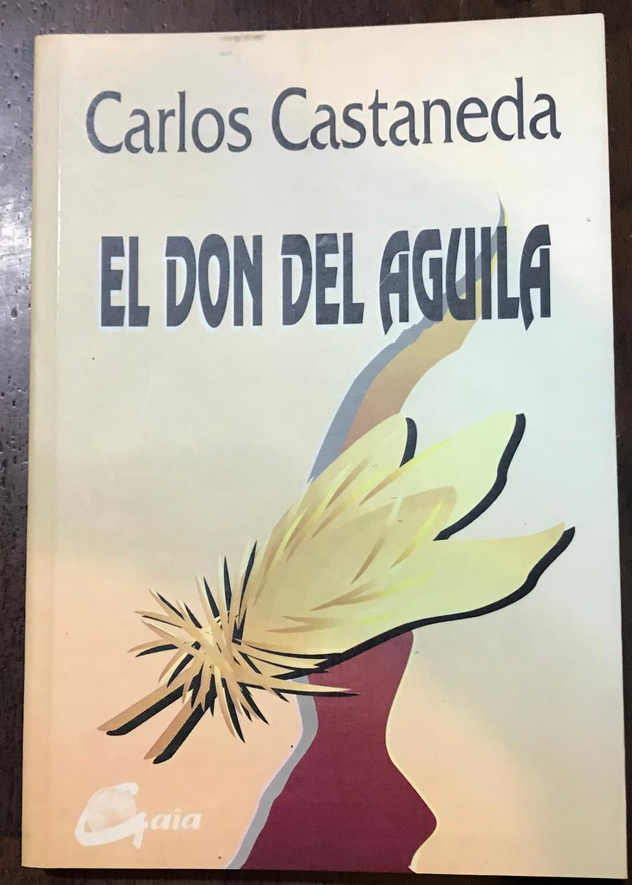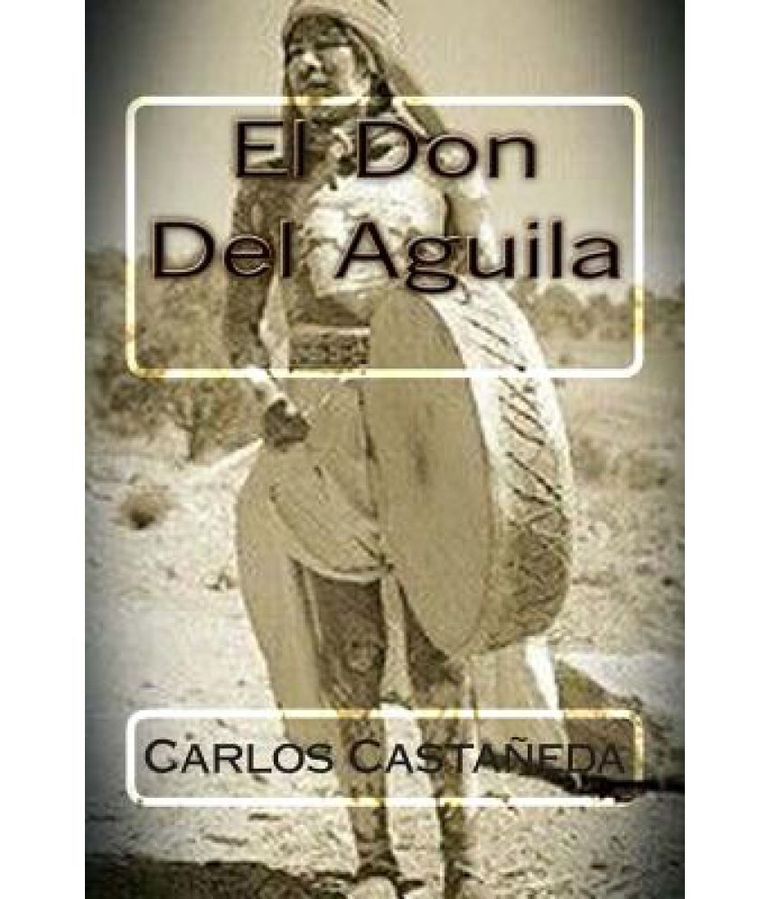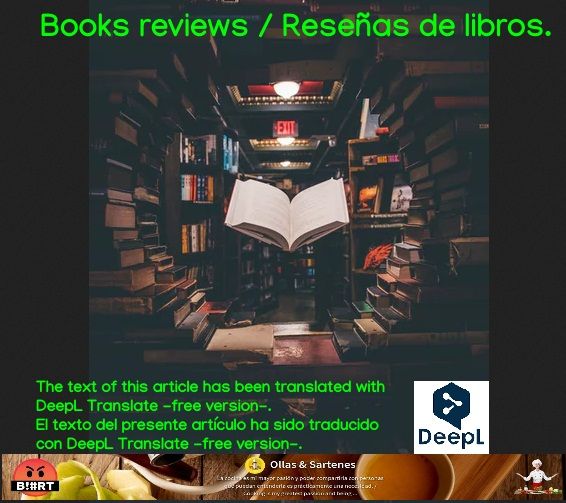
Hola, muy buenos días a todos los integrantes de esta hermosa comunidad.
Creo que es una comunidad nueva que tiene mucho para dar, específica en lo suyo, y a la cuál seguramente recurriremos seguido aquellos, para los cuales, la lectura más que un hobby es una verdadera pasión, una necesidad.
Hecha esta introducción les digo que la reseña de hoy se refiere: El Don del Aguila de Carlos Castaneda.

Hello, good morning to all the members of this beautiful community.
Having made this introduction, I would like to tell you that today's review refers to: The Gift of the Eagle by Carlos Castaneda.

Castaneda es un escritor muy particular, totalmente consustanciado con ese mundo de creencias y prácticas que la sociedad moderna ha terminado de defin ir como brujería, y en efecto, de los brujos y semibrujos indios y su poder son al centro de sus obras.
Creo que la mejor manera de introducir su obra es refiriéndome textualmente a sus palabras: "Al poder que gobierna el destino de todos los seres se le llama el Águila, no porque sea un águila, sino porque los videntes se les aparece como una incomensurable y negrísima águila". "El Águila ha concedido un regalo a cada uno de todos los seres: el poder, si así lo desea, de buscar una apertura hacia la libertad y de pasar por ella". La Regla del Nagual. "El responsable de este cambio de enfoque en mi trabajo fue un indio yanqui del norte de México, Don Juan Matus, quien más tarde me presentó a Don Genaro Flores, un indio mazateco de México Central. Los dos eran adeptos practicantes de un antiquísimo conocimiento, que en nuestros días se le llama comúnmente, brujería y que se considera una forma primitiva de ciencia médica y psicológica, siendo en realidad una tradición de practicantes insólitamente disciplinados y de prácticas extraordinariamente sofisticadas. Los dos hombres se convirtieron en mis maestros más que en mIs informantes, pero yo aún así persistía, de una manera desordenada, en considerar mi tarea como un trabajo antropológico" - Fuente de la citación.

Castaneda is a very particular writer, totally consubstantiated with that world of beliefs and practices that modern society has ended up defining as witchcraft, and indeed, of the Indian witches and semi-witches and their power are at the center of his works.
I think the best way to introduce his work is to refer to his words: "The power that governs the destiny of all beings is called the Eagle, not because it is an eagle, but because it appears to the seers as an incommensurable and very black eagle". "The Eagle has bestowed a gift upon each and every being: the power, if he so desires, to seek an opening to freedom and to pass through it." The Nagual Rule. "Responsible for this change of focus in my work was a Yankee Indian from northern Mexico, Don Juan Matus, who later introduced me to Don Genaro Flores, a Mazatec Indian from Central Mexico. Both were adept practitioners of a very ancient knowledge, commonly referred to today as witchcraft and considered a primitive form of medical and psychological science, but in reality a tradition of unusually disciplined practitioners and extraordinarily sophisticated practices. The two men became my teachers rather than my informants, but I still persisted, in a haphazard way, in regarding my task as anthropological work."- Citation source.

El Don del Aguila es uno de los libros más personales de Carlos Castaneda que nos lleva a suponer que la ciencia (así llamada por el escritor) practicada por los llamados brujos mexicanos no es algo irreal, sino que cuenta con toda una tradición de expertos disciplinados perfectamente con un ceremonial tan complejo como extraordinario.
El autor nos lleva a sus experiencias personales, a las fuerzas misteriosas que integran este mundo del cuál nace una verdadera y propia filosofía de vida.
El Don del Aguila es su segundo libro en su segunda etapa como escritor.
El primero fue El Segundo Anillo de Poder.
En este libro se genera un hecho importante: Carlos y los demás aprendices comienzan al improviso a recordar palabras del Nagual Don Juan (que es el jede de brujos) que tenían totalmente olvidadas; en un ambiente que de repente cambia y pasa del "ambiente indígena" al desierto de Sonora y vicevera.
En esta ambiente los aprendices van completando la preparación y la experimentación para transformarse en brujos y aprender la verdadera diferencia entre "tonal" y "nagual" entre otras cosas.
A menudo se ven obligados a afrontar situaciones inconcebibles y hasta extremamente peligrosas, con instrucciones previas del Nagual al cuál después deberán relatar sus experiencias personales.

The Gift of the Eagle is one of Carlos Castaneda's most personal books that leads us to suppose that the science (so called by the writer) practiced by the so-called Mexican sorcerers is not something unreal, but that it has a whole tradition of perfectly disciplined experts with a ceremonial as complex as it is extraordinary.
The author takes us to his personal experiences, to the mysterious forces that integrate this world from which a true and proper philosophy of life is born.
The Gift of the Eagle is his second book in his second stage as a writer.
The first was The Second Ring of Power.
In this book an important event takes place: Carlos and the other apprentices suddenly begin to remember words of the Nagual Don Juan (who is the jede de brujos) that they had totally forgotten; in an environment that suddenly changes and goes from the "indigenous environment" to the Sonoran desert and vice versa.
In this environment the apprentices complete the preparation and experimentation to become brujos and learn the real difference between "tonal" and "nagual" among other things.
Often they are forced to face inconceivable and even extremely dangerous situations, with previous instructions from the Nagual to whom they must later relate their personal experiences.

Tal vez para entender la obra de Carlos Castaneda hay que comenzar desde el inicio con sus libros. Definido por si mismo como antropólogo es una persona que trató de borrar todos sus datos personales e incluso hasta su muerte es una incógnita.
Pero dejando de lado esta parte excéntrica de su vida lo más importante de destacar en su libros es la recuperar de una identidad mexicana perdida (a pesar de que él mismo era peruano) de ese nahualismo (o brujería) tradicional mesoamericano, al cual el escritor y muchos de sus pares que no han tratado el tema en profundidad se han referido con frecuencia como una forma muy antigua y olvidada de ritos mágicos y religiosas con profundas raigambres en la cultura indígena de la región.
Sus sostenedores afirman que sus libros tienen un valor histórico y arqueológico. Sus detractores, en cambio, sostienen que ha usado hechos reales para divinizarlos.
Lo cierto es que, en un modo u otro, ha recuperado literariamente una cultura ancestral mesoamericana con rituales que parecían perdidos en los laberintos del tiempo.

Perhaps to understand the work of Carlos Castaneda we must start from the beginning with his books. Defined by himself as an anthropologist, he is a person who tried to erase all his personal data and even his death is an unknown.
But leaving aside this eccentric part of his life, the most important thing to highlight in his books is the recovery of a lost Mexican identity (even though he himself was Peruvian) of that traditional Mesoamerican nahualismo (or witchcraft), which the writer and many of his peers who have not dealt with the subject in depth have often referred to as a very old and forgotten form of magical and religious rites with deep roots in the indigenous culture of the region.
Its supporters claim that its books have historical and archaeological value. His detractors, on the other hand, maintain that he has used real facts to divinize them.
What is certain is that, in one way or another, he has literarily recovered an ancestral Mesoamerican culture with rituals that seemed lost in the labyrinths of time.

Upvoted. Thank You for sending some of your rewards to @null. Read my last posts to make sure that BLURT burning is profitable for you. Before using this bot please make sure your account has at least 100 BP. Get more BLURT:
@ mariuszkarowski/how-to-get-automatic-upvote-from-my-accounts@ blurtbooster/blurt-booster-introduction-rules-and-guidelines-1699999662965@ nalexadre/blurt-nexus-creating-an-affiliate-account-1700008765859@ kryptodenno - win BLURT POWER delegationNote: This bot will not vote on AI-generated content
Thanks @ctime!